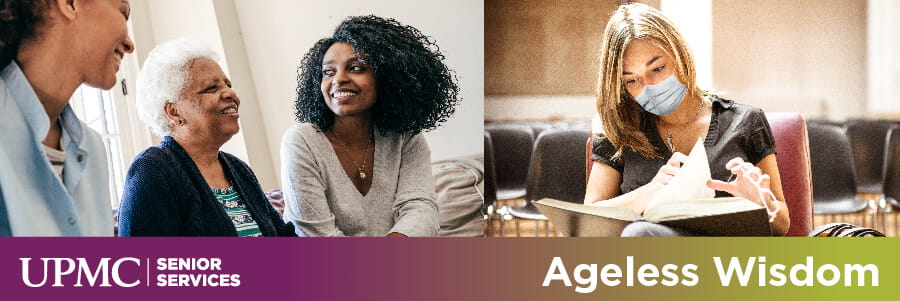Ageless Wisdom is an interactive and experiential geriatric sensitivity training program available in a two-hour and four-hour format.
UPMC Senior Services offers the training program to a wide array of audiences, including:
- Health care professionals
- Health care students
- Caregivers
- Employees from a variety of organizations
- Other community members
Objectives of the Program
The objectives of the program are to:
- Identify and experience normal changes as we age
- Identify and experience changes as a result of disease and disability associated with the aging process
- Discuss Golden Rules that outline strategies to manage the changes
- Help the audience to view aging as a positive experience
The program consists of the following segments:
Sensory Changes:
Experiential exercises demonstrate the normal and abnormal changes in hearing, vision, touch, taste and smell as we age.
By wearing different eyeglasses to simulate yellowing of the eye lenses, glaucoma, diabetic retinopathy, macular degeneration, cataracts and hemianopia, the audience experience how vision changes could affect an older person’s ability to perform normal daily activities.
The participants take a simulated hearing loss “test” to understand how life of an older person can be affected by loss of hearing.
Changes in smell, taste and touch are demonstrated through a variety of exercises.
Changes in Cognition:
Normal and abnormal changes in memory are discussed and several simulation exercises emphasize how someone with dementia functions in their environment.
A short video showcases an example of an older adult with memory loss followed by a discussion on verbal and nonverbal communication techniques.
Psychological Changes:
Risk factors for depression and anxiety are explored along with suggestions on how to prevent and manage these debilitating conditions.
Throughout the program the predisposing risk factor of loss is demonstrated with an ongoing exercise that causes the participants to imagine loss at a personal level.
Functional Changes:
Aging brings many functional changes that are explored during the program. The importance of balance and gait in maintaining mobility and reducing falls are discussed.
Using bandages, slings, weights, and other equipment, the audience experience functional changes due to disability and disease. Participants are assigned one of five designated disabilities and are asked to perform tasks such as walking, eating, navigating an open corridor and effectively communicating with others.
Social Changes:
The vulnerability of seniors is examined with emphasis on the signs and symptoms and types of abuse.
Prevention, reporting, and management of caregiver stress are discussed. In addition, the importance of driver safety is reviewed through a role play exercise depicting an older adult about to lose his driving privileges.
Diversity and Aging:
Current demographics of our diverse population are discussed and examples of the necessity of adapting care to meet the needs of an older adult with a different cultural background and the importance of supportive services are provided.
Myths about Aging:
Participants are assigned an endearing name at the beginning of the program that seniors are frequently called. An exercise to address our misconceptions about the older adult population is provided to allow participants to reflect upon their own beliefs about aging.
The program concludes with a guided imagery session which facilitates the recognition of the myths associated with the aging process and how our beliefs directly impact the care older adults receive.



















